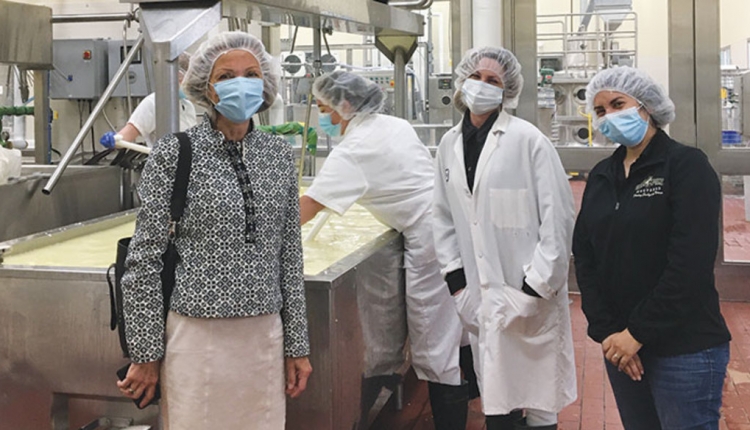
When farmers are asked to talk about their farms, they often include the basic facts such as where it’s located, how much land they have, and the number of animals. Often, farmers mention what generation they represent on the family farm. It’s included as just another statistic, rolling confidently off the tongue as if passing down a farm from one family member to another is simple. As anyone involved knows, a successful transition between generations takes a lot of personal, business, and financial planning.
Michigan State University Extension Specialist Roger Betz is a farm business educator based in southern Michigan. At this year’s Great Lakes Regional Dairy Conference in Frankenmuth, Mich., he hosted a panel where producers Zoey Nelson of Wisconsin and Mike Halfman of Michigan shared their experiences. He also gave his insight into how to begin the conversation and what information farmers need to compile before initiating the process.
Equitable, not equal
Betz understands the emotional aspect of handing down the farm, and he learned it early in his own personal life. His father died when he had just graduated from college, and Betz’s brother was farming on their family operation. In his will, his dad divided the farm in the way he thought would best help the family as a whole, and even though it wasn’t an even split, Betz also considered it to be the best decision.
“My brother and I have never had a problem,” he said. “Everyone has a different story, and people have to do what works for the entire family.”
While at Michigan State University Extension, Betz got involved with the record keeping and financial side of farming, and with that, it became natural to talk about succession planning. Extension has held five-week workshops, one-day classes, and breakouts at conferences on the topic.
With busy schedules, it was difficult for people to commit to the classes. Many families consulted Certified Public Accountants (CPAs) or attorneys, but Betz said sometimes it led to more misunderstandings if the long-term goals weren’t considered.
“Business succession and estate planning happens with me sitting at a kitchen table with families,” he said. “I work with the attorneys and CPAs and provide guidance, since it gets confusing for the families sometimes. Who’s paying what bill? Who’s paying the taxes on the land? Who’s paying rent for the new business? We get very in-depth,” noted Betz.
Succession planning doesn’t end with the initial plan. There is need for considerable follow-up.
“People get lost five years into it, and they don’t remember what was set up,” he said. “We bring them back and go over it — dad was going to gift this old machinery, this was going to be rent to own, this was part of a trade in — just to remind people and keep everyone on track.”
Betz walks people through the five crucial areas — finance, personnel, marketing, information, and production.
Tackling tough questions
He also asks the tough questions people need to face, like if the parents are ready for a partner, if the next generation is committed to farming, and if the business makes enough money to support everyone. He encourages all parties to write down their ideas, goals, and questions, making sure that each area of concern is addressed.
The Michigan State specialist leads them through meeting the critical success factors, such as readiness, profitability, and support of the nonheirs. He stresses that open communication, professional assistance, and especially time will all help the process.
Most of his questions, both in his role and at the conference, are about how to start the process in the first place.
“Lots of people tell me that they can’t talk to their folks,” said Betz. “Everyone knows something needs to be done, but it’s emotional and extremely difficult to talk about death. Sometimes, being an outside person helps people discover what might work best,” he said.
In general, the process takes an enormous amount of time and consideration.
A common phrase in the succession industry is “Grandma’s yellow pie plate,” which was a 1970s workshop series hosted by extension. It refers to a beloved item that has sentimental emotion attached to it. Betz believes that this type of terminology helps people think because everyone has to recognize emotions are attached to possessions.
“For everyone, it really takes a lot of patience,” he said.
Betz said that while everyone wants to hear about the succession planning that went wrong, he also really likes talking about the ones that went well.
“I like to think I have quite a few success stories,” he said. “At one time, I was working with a family that was dealing with nine households of family members. At one point, I had a 47-step plan for them. It took a lot of time and it lasted for years. Now, they still thank me and tell me they appreciate it.”
Panelist Mike Halfman has been through two succession planning agreements, once when he became a partner in 2004, and then when two more individuals became partners in 2009. He agrees with Betz on the complexity of the task.
“I think when people think about succession planning, they think about the dollars and cents and taxes. But Roger did a nice job talking about the importance of having all the generations on the same page. That way, when problems arise, it’s not such a point of contention because you’ve already talked about it,” Halfman said.
Halfman also discussed the complexity of dealing with each individual circumstance.
“An hour session really just started to scratch the surface, because it’s so complicated. There are an endless number of ways to make it work, but endless ways to make it fail, too,” said Halfman. “Roger kept coming back to communication and tough discussions — like, what if a partner isn’t pulling his weight? Can he be fired? There’s a huge benefit in having a third party mediate the meetings, because you need rules ahead of time on these difficult issues.”
No perfect plan
Betz’s final message at the conference was that there’s no perfect plan, but working together as a team, with a lot of time to talk about it, will get the best results. Of course, the succession will happen one way or another, so it’s considerably better to be prepared.
“None of these plans work unless someone sacrifices. The margins are too thin for all five kids to get an equal share. If there’s a buyout, the farm can’t be as competitive. If the goal is for the family farm to continue, there has to be some sacrifice somewhere,” he said.








